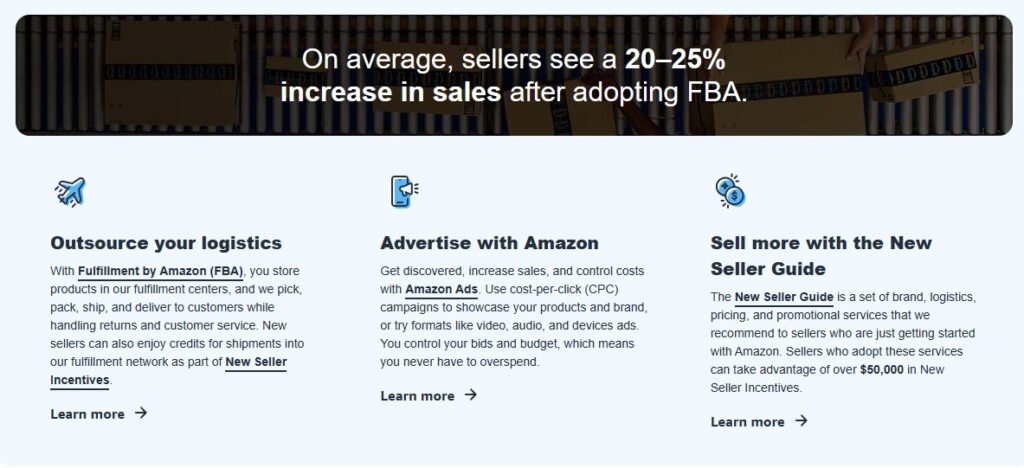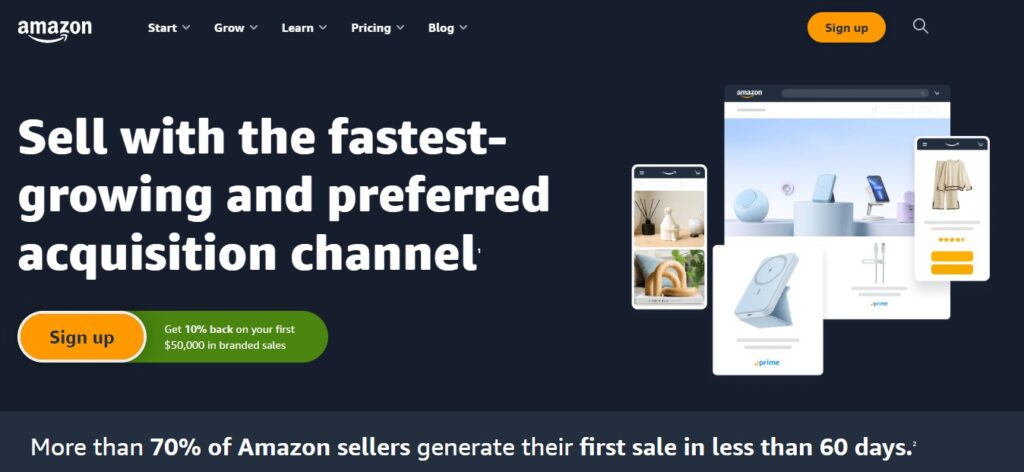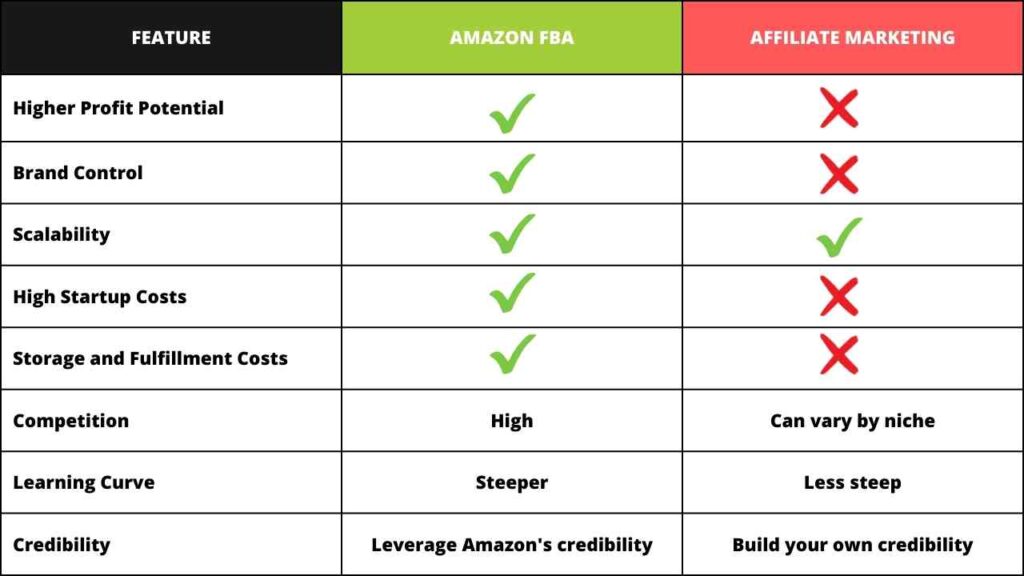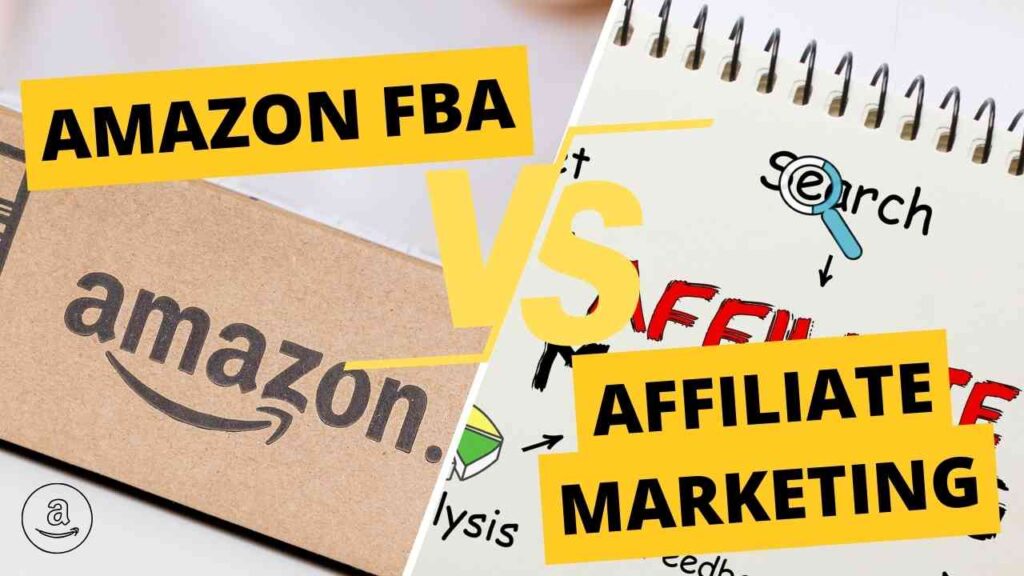Hey there, fellow ecommerce enthusiasts! Umair here, your friendly guide to navigating the exciting world of online business. Today, we’re diving into a classic debate: Amazon FBA vs. Affiliate Marketing.
Both are fantastic ways to build an online presence and potentially turn a profit. But with all the information out there, it can feel overwhelming to choose which one’s right for you. Don’t worry, I’ve been there! That’s why I’m here to break down the key differences and help you pick the path that best suits your goals and interests.
Been there, pondered that:
- Should I invest in inventory or not?
- Amazon FBA involves buying and storing products, while affiliate marketing lets you promote other people’s stuff.
- How much control do I want over the product?
- With FBA, you’re the brand owner. In affiliate marketing, you’re recommending someone else’s creation.
- How much time can I dedicate to this?
- FBA requires upfront product research and listing optimization. Affiliate marketing focuses on driving traffic to your recommendations.
Let’s unpack these concepts further!
Amazon FBA: The Hands-On Approach

Imagine having your own virtual storefront on Amazon, the retail giant. That’s the essence of Amazon FBA (Fulfillment by Amazon). You source products, send them to Amazon’s warehouses, and they handle everything from picking and packing to shipping and customer service. Pretty neat, right?
Here’s what to consider with FBA:
- Investment: You’ll need capital to buy inventory, which can be a risk if the products don’t sell well.
- Profit Potential: Profits can be higher compared to affiliate marketing, especially for popular products.
- More Control: You have more control over branding, pricing, and promotions.
- Learning Curve: Researching profitable products, optimizing listings, and managing inventory require time and effort.
Think of it like this: FBA is like opening your own store in a high-traffic mall (Amazon’s platform). It’s exciting, but there’s rent to pay (inventory costs) and you need to manage the stock yourself.
Affiliate Marketing: The Recommendation Route

Ever raved about a restaurant to your friends and they ended up loving it? That’s the basic idea behind affiliate marketing. You promote other companies’ products on your website, social media, or blog, and earn a commission for every sale you generate through your unique affiliate link.
Here’s the skinny on affiliate marketing:
- Low Startup Costs: No need to buy inventory – you’re simply promoting existing products.
- Passive Income Potential: Once your recommendations are established, you can earn commissions even while you sleep (well, maybe not literally).
- Flexibility: Promote a wide range of products across various niches.
- Success Relies on Marketing: You need to drive traffic to your affiliate links to make sales.
Imagine being a social media influencer: You partner with brands you love and recommend their products to your audience. If someone clicks your link and buys something, you get a commission. Easy, right? Well, building a successful audience takes time and effort.
Amazon FBA vs Affiliate Marketing: Pros and Cons

Amazon FBA Pros
- Higher Profit Potential: You can potentially earn higher profits per sale compared to affiliate marketing commissions.
- Brand Control: You have complete control over your brand image, pricing, and promotions.
- Scalability: Once your products are established, you can easily scale your business by adding more inventory.
- Credibility: Selling on Amazon lends credibility to your brand and products.
Amazon FBA Cons
- Investment: Requires upfront investment in buying inventory, which can be a financial risk.
- Storage and Fulfillment Costs: You’ll pay Amazon storage and fulfillment fees, which can eat into your profits.
- Competition: High competition on the Amazon marketplace can make it challenging to stand out.
- Learning Curve: Requires research, product listing optimization, and inventory management skills.
Affiliate Marketing Pros
- Low Startup Costs: No need to buy inventory, making it an attractive option for beginners.
- Passive Income Potential: Once your affiliate links are established, you can earn commissions even while you sleep (well, mostly!).
- Flexibility: Promote a wide variety of products across different niches.
- Location Independence: You can run your affiliate marketing business from anywhere with an internet connection.
Affiliate Marketing Cons
- Lower Profit Margins: Affiliate commissions are typically lower than the profits you can make selling your own products.
- Reliance on Others: Your income depends on the performance of the merchant’s product and their commission rates.
- Marketing Effort Required: Driving traffic to your affiliate links takes time and consistent marketing effort.
- Competition: Competition can be high in certain niches, making it challenging to get noticed.

Conclusion
So, FBA or Affiliate Marketing? You Decide!
There’s no one-size-fits-all answer. The best option depends on your resources, risk tolerance, and goals.
Here are some questions to ponder:
- Do you have a product idea you’re passionate about selling? (Then FBA might be a good fit)
- Are you a marketing whiz who enjoys building an audience? (Then affiliate marketing could shine)
- How much time and money can you initially invest?
Remember, you can even explore a hybrid approach! Start with affiliate marketing to learn the ropes of online sales, then use your earnings to invest in FBA products later.
The most important thing is to take action! Do your research, experiment, and find what works best for you. And hey, if you have any questions along the way, feel free to leave a comment below. We’re all in this ecommerce journey together!
Read more:




